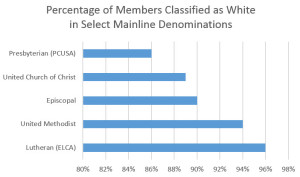 Race related topics have been featured in the news more in recent months than any time I can recall. Mainline Protestants generally tend to have healthy perspectives on race. Such philosophical and even theological understandings do not necessarily translate into action (for example: read my summary and reflection of Bradley Wright’s recent research showing that Mainline Protestant congregations had the highest rate of discrimination to prospective visitors) nor do they lead to racially diverse communities of faith.
Race related topics have been featured in the news more in recent months than any time I can recall. Mainline Protestants generally tend to have healthy perspectives on race. Such philosophical and even theological understandings do not necessarily translate into action (for example: read my summary and reflection of Bradley Wright’s recent research showing that Mainline Protestant congregations had the highest rate of discrimination to prospective visitors) nor do they lead to racially diverse communities of faith.
Earlier this week the Pew Research Center published data about the most and least racially diverse religious groups in the United States. The Mainline/Oldline/Sideline/Liberal/Progressive denominations did not fare well. While 66% of the American population is white the percentages in these traditions are much higher, including:
- Lutheran (ELCA) – 96%
- United Methodist – 94%
- Episcopal – 90%
- United Church of Christ – 89%
- Presbyterian (USA) – 86%
So What?
I have served congregations affiliated with three of the five traditions listed above. While these traditions are 85%+ white, the congregations I have served had even higher percentages of members who were white than did their respective denominations. In each case the communities claimed to welcome all people yet rarely talked about the reasons why people who were not of the majority race visited and joined in numbers far less than their respective percentage of the general population in the geographic areas surrounding their sacred spaces.
If you are part of a Mainline tradition and these stats do not trouble you, then I invite you to ask yourself why they do not trouble you. If for some reason you still have not found an answer, ask others in your community of faith for their wisdom.
- Why do you think these Mainline denominations are among our country’s least racially diverse religious traditions?
- How does the percentage of white people within your local congregation compare to the percentage of white people within your denomination?
- What are a few practical actions people can take to start healthy and potentially productive conversations about these topics within their own communities of faith?
Note: On August 9 the United Church of Christ is inviting all of its roughly 5,000 congregations to consider including Prayers for Racial Justice in worship.